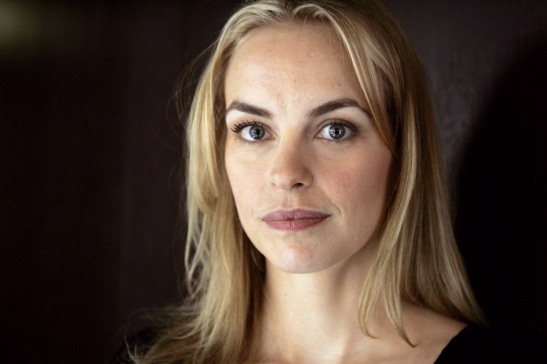Interview: Nina Hoss talks ‘Phoenix’ and the Holocaust
 Nina Hoss is the phenomenal, statuesque German actress who has etched her impressive talent on such fare as A Most Wanted Man (2014), Barbara (2012) and Yella (2007). She’s also left her mark on music, after her appearance on the Manic Street Preachers ‘Europa Geht Durch Mich’ from last year’s Krautrock-influenced Futurology LP.
Nina Hoss is the phenomenal, statuesque German actress who has etched her impressive talent on such fare as A Most Wanted Man (2014), Barbara (2012) and Yella (2007). She’s also left her mark on music, after her appearance on the Manic Street Preachers ‘Europa Geht Durch Mich’ from last year’s Krautrock-influenced Futurology LP.
She now stars in Phoenix: another film in collaboration with the director Christian Petzold. It is their third pairing. And it’s a wonderful film; focusing on the experiences of her character, Nelly, a disfigured concentration-camp survivor, who goes on the hunt to find the husband who may have betrayed her to the Nazis.
Reminiscent of the probing and thoughtful work of Bergman and Kieslowski, it is a delicate and devastating film, and one that features one of the best closing scenes in film in recent memory.
We talked to her about the making of Phoenix and the politics of the holocaust.
The film depicts the impression that the Jewish people in Germany felt very betrayed by their own people – the Germans – and after the war, they were suddenly welcomed by the people who had pushed them away. Were you aware of that?
Yes, I was, because you have these periods of time that you really learn about in school and especially, what I was interested in, was ‘what happened after the war?’ What were the fifties about? I think this movie really shows you how much of the denial there was in Germany, because if you watch movies from the fifties, they’re all in the mountains, guarding sheep and having a jolly life.
They didn’t want to go to the cities and the real life and tackle what happened in this country. The fifties came and it was, ‘let’s build up this country again. You also come back and let’s do it all again and pretend that nothing happened’.
That was until the younger generation came and said, ‘excuse me, what’s going on? You were there. You saw it. What did you do? You’re my teacher. You taught under the Hitler regime?’ That all started much later, when brave people started to raise questions, so I, as a German, was very aware of that movement of what happened right after the war; and what led to the student revolt.
What were you taught at school?
Were we taught about the holocaust, do you mean? Oh yeah! For years! You really learn about it a lot. You discuss it a lot. (Read) all the novels. It really is something you talk, learn and discuss about. I was always interested in that topic, so I had read a lot.
For this movie specifically, there was amazing documentation, like Claude Lanzmann’s Shoah (1985), which was one of these movies where I had always seen extracts, but never the 9 hour thing, and that helped me so much for Nelly. If you see that, you understand a lot. Or you don’t.
I still don’t understand how that could happen, but you understand what they went through and how the people who survived it, talked about it. They always seem to have it under control and want to tell the world what happened to them. There’s always this moment where they lose their voice or they start crying, but they keep on talking.
So I thought, if that’s 30 years after…. There’s not so much about how they felt right after. You have one book, Primo Levi, where he feels this rejection and he can’t talk about it; falling into depression and all that.
To me, I thought (the character of Nelly), was like a new-born. She doesn’t know how to move. Everything is stripped off of her; all of her identity, her dignity, her being a woman. She’s like an alien with this bandage. And with that, she follows her gut feeling, which I think led her to survive this concentration camp.
.jpg)
Ordinarily, with a film like this, the conventional wisdom would be to show flashbacks in order to contextualise the relationship between you and your husband prior to the separation. The fact that it does not do that, I thought that was quite brave. Did it make it harder for you to get into character and for the chemistry of that relationship to be realised?
No, not really, because we talked about what our story is and how we met, and our friends and what our life was about; who we were.
I always thought that Nelly was the one who didn’t think much… she just followed her heart, because why would she come back? At the very beginning, you learn that she came back in ’38, which was already a time where it was a very dangerous for a Jew to be in Berlin. Obviously, it was because of Johnny (her husband). So Nelly always followed her guts.
It’s this kind of lightness and spirit that she wants to get connected with again. She had lost that lightness.
Was that devastating final scene the hardest scene to shoot?
No, I was actually waiting for that scene! Because everything led to that moment. We had shot almost chronologically and I was totally with her. She has this ‘moment’ and I was very, very happy!
Interview by Greg Wetherall
@gregwetherall
Phoenix is distributed by Soda Pictures and is in selected cinemas from 8th May 2015.
